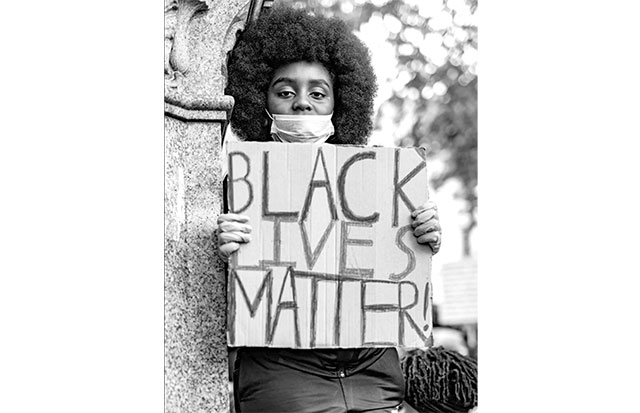For centuries racism has been the primary tool for the enslavement and colonisation of nations, used to divide and control people of colour.
Almost three weeks ago, the world erupted when an unarmed man, George Floyd, was killed by police officers in Minneapolis, in the United States. His death triggered a wave of radical anti-racism responses across the globe with #BlackLivesMatter leading the revolution.
Namibia, a country with a sinister history of genocide, colonisation and apartheid, has also joined the movement by confronting racism in public spaces and calling for the removal of racist landmarks.
Social activist, photographer and journalist Hildegard Titus earlier this week started an online petition calling for the removal of the statue of German Schutztruppe officer Curt von François from the corner of Sam Nujoma Drive and Independence Avenue in Windhoek.
“The statue was erected on 18 October 1965 to commemorate the 75-year anniversary of his supposed founding of Windhoek in 1890,” the online petition reads, adding that keeping the monument “is a painful erasure of the city’s history and that of its rightful founder, Jonker Afrikaner”.
Titus believes the current insurgent response to this statue, as well as to the ‘Gallows’ at Henties Bay, was fuelled by the tension caused by the coronavirus outbreak.
“Statistics have shown that the virus has affected non-white people more than others, and it’s ultimately because historically most of us end up doing essential work, such as being nurses or food vendors,” she says.
“How people have been affected by that was already a tipping point, and when George Floyd was murdered, it sent people over the edge,” Titus says.
She mentions the discriminatory treatment of black people is not only confined to the US, but happens around the world.
“Different black communities across the world, whether in the UK, Europe and even down here, all recognised we’re systemically being abused,” she says, adding that abuses range from being unjustly murdered to receiving low wages and not enjoying the same privileges as others.
“Despite us being an independent country, 30 years on, the power is still very much within white people. Although our government is black, a lot of our institutions, from our petrol stations to the shops and farms, are still controlled by white people at every level of production in this country. And thus, they also control us.”
While Namibia has miscellaneous concerns, the government focuses on building infrastructure, hospitals and schools, but they are not steadfast in righting colonial wrongs, Titus says.
She says the removal of these structures is just the first step before adjusting daily actions.
“When you go to smaller towns, apartheid is still fully there.”
Visual artist, singer-songwriter, social activist and academic Nashilongweshipwe Muushandja earlier this week applauded the Namibian youth when addressing Facebook user Corien Steenkamp, who posted deeply offensive and blatantly racist comments on the platform, which ultimately led to her suspension from a private school at Walvis Bay.
“You have to follow the patterns, Black Lives Matter has been happening for a while and is a continuity of many years of calling for anti-racism,” says Muushandja.
The anti-racism movement has journeyed through anti-slavery to decolonisation to anti-colonial work and is currently in the decolonial turn, which is witnessing the falling of statues and monuments, police stations burning and holding museums accountable, he says.
“It is more charged now, as it is a very interesting time in history, because the Covid-19 trauma is already present.”
Muushandja says the youth has a different understanding of what an anti-racist society should look like, and most of the recent movements were initiated by young people.
“It’s important for young people to be the leaders of these things, because they have to answer for tomorrow.”
The media, particularly The Namibian, has been the topic of discussion for what many social media users term racial bias in recent reporting, sparking a public outcry.
“The media needs to be decolonised. It needs to understand the politics and importance of representation,” says Muushandja.
“If that education is not there, the whole media spectrum will be left behind. In Namibia we are failing, because we don’t have training on how to do journalism regarding tribalism. This is the theoretical and practical knowledge needed and the awareness that we have a racial history.”
Stay informed with The Namibian – your source for credible journalism. Get in-depth reporting and opinions for
only N$85 a month. Invest in journalism, invest in democracy –
Subscribe Now!







